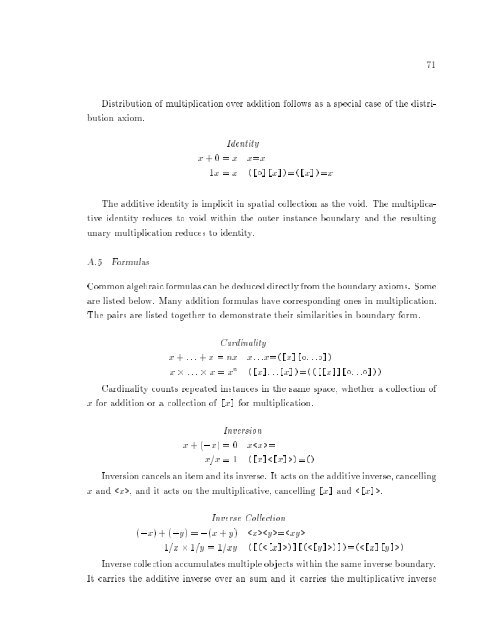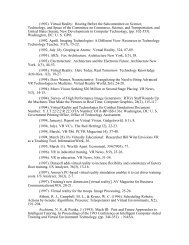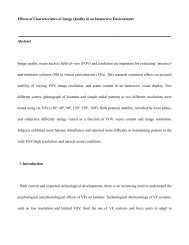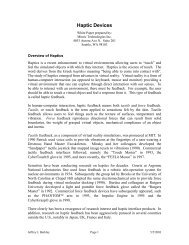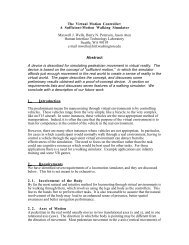A Calculus of Number Based on Spatial Forms - University of ...
A Calculus of Number Based on Spatial Forms - University of ...
A Calculus of Number Based on Spatial Forms - University of ...
You also want an ePaper? Increase the reach of your titles
YUMPU automatically turns print PDFs into web optimized ePapers that Google loves.
71<br />
Distributi<strong>on</strong> <str<strong>on</strong>g>of</str<strong>on</strong>g> multiplicati<strong>on</strong> over additi<strong>on</strong> follows as a special case <str<strong>on</strong>g>of</str<strong>on</strong>g> the distributi<strong>on</strong><br />
axiom.<br />
Identity<br />
x +0=x x=x<br />
1x=x ([][x])=([x])=x<br />
The additive identity is implicit in spatial collecti<strong>on</strong> as the void. The multiplicative<br />
identity reduces to void within the outer instance boundary and the resulting<br />
unary multiplicati<strong>on</strong> reduces to identity.<br />
A.5 Formulas<br />
Comm<strong>on</strong> algebraic formulas can be deduced directly from the boundary axioms. Some<br />
are listed below. Many additi<strong>on</strong> formulas have corresp<strong>on</strong>ding <strong>on</strong>es in multiplicati<strong>on</strong>.<br />
The pairs are listed together to dem<strong>on</strong>strate their similarities in boundary form.<br />
Cardinality<br />
x + :::+x = nx x:::x=([x][:::])<br />
x :::x= x n ([x]:::[x])=(([[x]][:::]))<br />
Cardinality counts repeated instances in the same space, whether a collecti<strong>on</strong> <str<strong>on</strong>g>of</str<strong>on</strong>g><br />
x for additi<strong>on</strong> or a collecti<strong>on</strong> <str<strong>on</strong>g>of</str<strong>on</strong>g> [x] for multiplicati<strong>on</strong>.<br />
Inversi<strong>on</strong><br />
x +(,x)=0 x=<br />
x=x =1 ([x])=()<br />
Inversi<strong>on</strong> cancels an item and its inverse. It acts <strong>on</strong> the additiveinverse, cancelling<br />
x and , and it acts <strong>on</strong> the multiplicative, cancelling [x] and .<br />
Inverse Collecti<strong>on</strong><br />
(,x)+(,y)=,(x+y) =<br />
1=x 1=y =1=xy ([()][()])=()<br />
Inverse collecti<strong>on</strong> accumulates multiple objects within the same inverse boundary.<br />
It carries the additive inverse over an sum and it carries the multiplicative inverse


